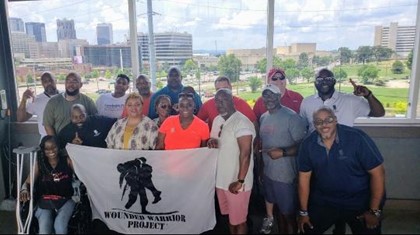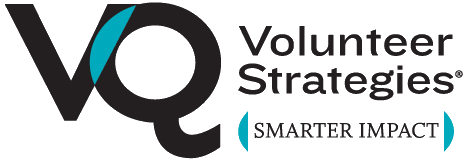Blog: Adapt and Overcome

In honor of Veterans Day, we are reposting an e-newsletter we shared in fall 2020 highlighting the flexibility and adaptiveness of our partners at Wounded Warrior Project to sustain support. The lessons from their efforts are relevant still.
Adapt and Overcome:
How 2020 Brings Innovation and Flexibility for Volunteer-Led Programs
For the US Marines, the concept of “Adapt and Overcome” is central to their philosophy of innovation and problem solving to address all challenges, unexpected situations, and chaotic environments. When Wounded Warrior Project, an organization dedicated to serving veterans and service members from all branches of the military, faced restrictions on in-person gatherings due to the Coronavirus pandemic in March 2020, the volunteer leaders of some of the organization’s most vital programs embraced the concept wholeheartedly, finding ways to adapt and overcome so they could continue delivering on their commitment to fellow veterans and service members.
Peer Support Groups are among the many ways that Wounded Warrior Project (WWP) serves veterans and service members who incurred a physical or mental injury, illness, or wound while serving in the military on or after September 11, 2001. Through Peer Support Groups, warriors connect with each other, work to overcome challenges, and develop a renewed sense of community. Support Groups are facilitated by trained volunteers, Peer Support Group Leaders, who plan and lead not only the support groups but also events to engage and build connections with warriors and their families.
Due to safety restrictions associated with the pandemic, support groups were suddenly not allowed to meet in person. Yet, in the spirit of “adapt and overcome,” peer support group leaders pivoted quickly, and, within the first 10 weeks of the pandemic, more than 200 support groups had been held virtually. By this fall, that number has continued to increase. The following is an interview with Peer Support Group Leader Joel Grace from Montgomery, AL about his experience as a leader during this challenging year.
VQ:
Tell me about your role and the peer support group prior to the pandemic.
JG:
Before COVID-19, I and two group leaders led monthly peer support meetings with people who had experienced physical challenges and other issues. We generally had 20-30 warriors at each meeting. We also held events at least quarterly, doing volunteer work with the food bank and local schools, as well as social events – like movie nights, bowling, and holiday celebrations. The important thing to understand is that we aren’t a “group.” We are a family. We bring spouses and kids. My kids know the other members’ kids. We really are a family.
VQ:
How did all that change in March of this year?
JG:
March brought a big transition. We could no longer do any more face-to-face meetings. It wasn’t easy, as we had built bonds with our warriors over four years. But our warriors understood the safety concerns and quickly adopted the military stance of “adapt and overcome.” Wounded Warrior Project was really helpful with the transition to a virtual platform. The staff team sent information, helped us do a few dry runs with the technology platform so we were sure to understand all the functions, and we figured it out. Even those who initially had their cameras upside down figured it out quickly! We adapted and overcame.
VQ:
How was the participation?
JG:
I was surprised at the participation we had. In addition to having our regulars switch to the virtual platform, almost every month we have had a few new faces! We support people in different stages of recovery and they may not all be comfortable meeting in person. So, this provided an opportunity for new warriors to check it out and participate.
VQ:
What difference has the virtual platform made for you and the participants?
JG:
I am so grateful that Wounded Warrior Project provides us the virtual platform. I think for some of the warriors, this is just a great outlet and helps them forge friendships they wouldn’t otherwise have. They look forward to seeing each other.
It really has been important to be able to sustain the peer support groups. Before the pandemic, there were warriors who hadn’t been getting out but the peer support group was helping them reconnect with others. Then the pandemic hit, and everyone had to stay in. There was a risk that some warriors might go backwards in their recovery and retreat into isolation. It was so important that they know that we are still here, that we expect to see them, and that we can keep connections with them. It has taken us years to build these connections, there was no way we were going to let our group fall apart just because of COVID.
VQ:
What is next for your Peer Support Group?
JG:
We would like to keep some elements available via the virtual platform. We plan to go back to face-to-face meetings this fall, and we’ll follow state and local guidelines for social distancing, hand sanitizer, masks, etc. But, some members may not be comfortable coming back in person, so we hope to offer hybrid for those individuals so they don’t feel isolated from the group.
VQ:
What advice do you have for other organizations trying to pivot and sustain their volunteer-led support groups during these restrictions?
JG:
Be creative. There are always alternatives. Even if you can’t switch to online platforms, you can text or call someone to make sure they know you are still there for them. The most important thing is to stay connected, whatever way that looks. Let people know that, though their environment may be changing, we are still here for them. And, for the volunteers, remember that they are there to serve the group members. It’s not about us, it’s about the group. Actually, it’s about the family.
Tips for Sustaining Volunteer-Led Support Groups
- Provide technology and training to ensure volunteer leaders can facilitate online sessions
- Develop protocols and policies to ensure privacy and safety when using online technology (e.g., Do participants have the option to participate without webcams to protect their own privacy? Are you using passwords to ensure security of the online convenings?)
- Leverage alternative means to support participants as well (e.g., phone calls, emails, texts, buddy system)
- Consider continuing to offer a virtual option to allow for flexibility and access for all
